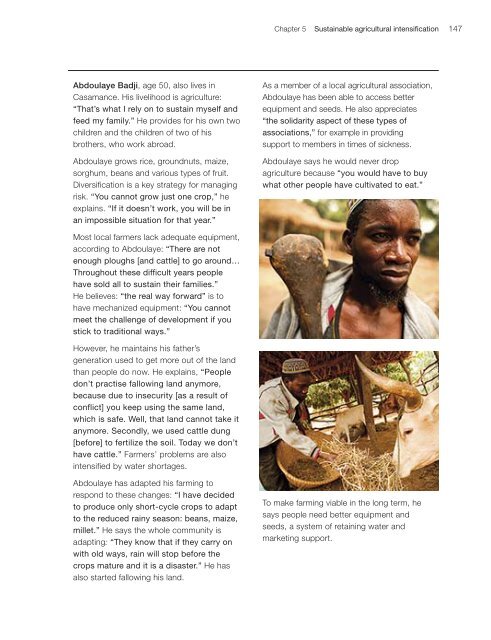English - IFAD
English - IFAD
English - IFAD
You also want an ePaper? Increase the reach of your titles
YUMPU automatically turns print PDFs into web optimized ePapers that Google loves.
Chapter 5 Sustainable agricultural intensification 147<br />
Abdoulaye Badji, age 50, also lives in<br />
Casamance. His livelihood is agriculture:<br />
“That’s what I rely on to sustain myself and<br />
feed my family.” He provides for his own two<br />
children and the children of two of his<br />
brothers, who work abroad.<br />
Abdoulaye grows rice, groundnuts, maize,<br />
sorghum, beans and various types of fruit.<br />
Diversification is a key strategy for managing<br />
risk. “You cannot grow just one crop,” he<br />
explains. “If it doesn’t work, you will be in<br />
an impossible situation for that year.”<br />
As a member of a local agricultural association,<br />
Abdoulaye has been able to access better<br />
equipment and seeds. He also appreciates<br />
“the solidarity aspect of these types of<br />
associations,” for example in providing<br />
support to members in times of sickness.<br />
Abdoulaye says he would never drop<br />
agriculture because “you would have to buy<br />
what other people have cultivated to eat.”<br />
Most local farmers lack adequate equipment,<br />
according to Abdoulaye: “There are not<br />
enough ploughs [and cattle] to go around…<br />
Throughout these difficult years people<br />
have sold all to sustain their families.”<br />
He believes: “the real way forward” is to<br />
have mechanized equipment: “You cannot<br />
meet the challenge of development if you<br />
stick to traditional ways.”<br />
However, he maintains his father’s<br />
generation used to get more out of the land<br />
than people do now. He explains, “People<br />
don’t practise fallowing land anymore,<br />
because due to insecurity [as a result of<br />
conflict] you keep using the same land,<br />
which is safe. Well, that land cannot take it<br />
anymore. Secondly, we used cattle dung<br />
[before] to fertilize the soil. Today we don’t<br />
have cattle.” Farmers’ problems are also<br />
intensified by water shortages.<br />
Abdoulaye has adapted his farming to<br />
respond to these changes: “I have decided<br />
to produce only short-cycle crops to adapt<br />
to the reduced rainy season: beans, maize,<br />
millet.” He says the whole community is<br />
adapting: “They know that if they carry on<br />
with old ways, rain will stop before the<br />
crops mature and it is a disaster.” He has<br />
also started fallowing his land.<br />
To make farming viable in the long term, he<br />
says people need better equipment and<br />
seeds, a system of retaining water and<br />
marketing support.

















